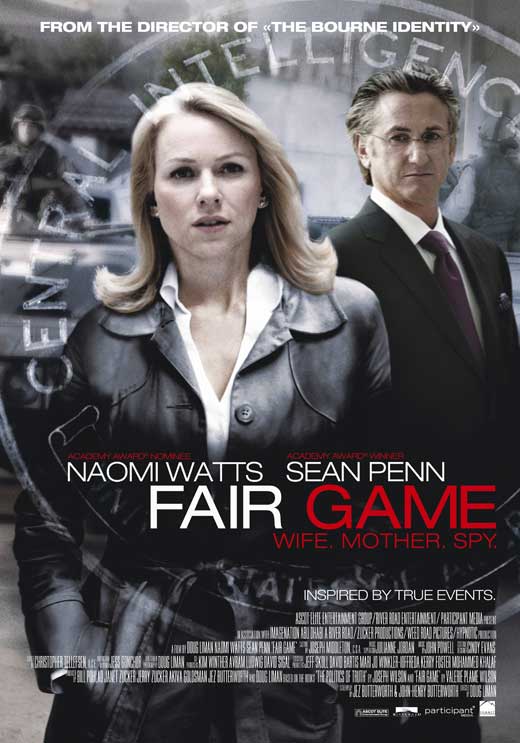The film is, basically, a dramatization of the Plame scandal. An event that I, personally, found reprehensible, on the part of the Administration at the time. However, my feelings about the real events are irrelevant when it comes to a dramatization of them.
What a terrible movie.
Truly god-awful.
First, it represents the worst of "socially conscious" filmmaking/storytelling, and reminded me of the worst kind of scripts we get a Stage Left. It's not concerned with people, only making a political point in the most ham-handed and inelegant way possible.
Second, Sean Penn, an actor I love and admire, is AWFUL. He takes Joe Wilson, and makes him a character who's motivation is, seemingly, to be right ALL THE TIME. When he begins his campaign to hold the White House accountable for the exposure of his wife, he keeps saying it's because it's "the right thing to do," but everything we've seen about the character, and the way Penn is playing it SCREAMS "I am a condescending, smug asshole."
CByrd and I both felt the same, I suggested that Tom Hanks could probably have knocked it out of the park...given you the sense of decency and honor. She suggested Mark Ruffalo, who's laid-back nature and style, would have made the character less grating.
What a terrible movie.
Truly god-awful.
First, it represents the worst of "socially conscious" filmmaking/storytelling, and reminded me of the worst kind of scripts we get a Stage Left. It's not concerned with people, only making a political point in the most ham-handed and inelegant way possible.
Second, Sean Penn, an actor I love and admire, is AWFUL. He takes Joe Wilson, and makes him a character who's motivation is, seemingly, to be right ALL THE TIME. When he begins his campaign to hold the White House accountable for the exposure of his wife, he keeps saying it's because it's "the right thing to do," but everything we've seen about the character, and the way Penn is playing it SCREAMS "I am a condescending, smug asshole."
CByrd and I both felt the same, I suggested that Tom Hanks could probably have knocked it out of the park...given you the sense of decency and honor. She suggested Mark Ruffalo, who's laid-back nature and style, would have made the character less grating.
Near the end the film tries to explore the
impact on the marriage, but these to actors have so little chemistry
together (like, ZERO), the viewer literally doesn't give a rat's ass
if they do break up. And Joe is so plain unpleasant, you think Valerie
would be better off. (It is, however, always nice to see Sam Shepard bring his understated honesty to the screen - he's clearly the best thing in the movie) The attempt to make a human connection to these characters is far too little, far too late.
Watts is fine, but pretty much steamrolled by Penn. When her choice is to play reserved nobility, the guy playing the frothing mouthpiece is going to win.
All the problems come to head when the climax is Penn giving a lecture to a group of students, and the audience, clearly, about citizenship. Then we see Watts enter a congressional hearing on the matter...and the film cuts to actual footage of Plame at the hearing.
A) What I have seen of Penn's character makes me absolutely disinterested in his lecturing me about how to be an American.
B) Valerie's testimony would seem to be a far more stirring and noble climax. I'm also always somewhat put off when a filmmaker decides to cut away from a performance to actual footage. It undermines whatever reality the actor had allowed us to buy into, up to that point. (See What's Love Got to Do With It? for perhaps the most egregious example, ever.)
It doesn't matter that I was horrified by what happened to this family in real life, which is, I suspect, why it received mainly positive reviews upon release. Politics alone doesn't make a good story, and this movie is a prime example.
Watts is fine, but pretty much steamrolled by Penn. When her choice is to play reserved nobility, the guy playing the frothing mouthpiece is going to win.
All the problems come to head when the climax is Penn giving a lecture to a group of students, and the audience, clearly, about citizenship. Then we see Watts enter a congressional hearing on the matter...and the film cuts to actual footage of Plame at the hearing.
A) What I have seen of Penn's character makes me absolutely disinterested in his lecturing me about how to be an American.
B) Valerie's testimony would seem to be a far more stirring and noble climax. I'm also always somewhat put off when a filmmaker decides to cut away from a performance to actual footage. It undermines whatever reality the actor had allowed us to buy into, up to that point. (See What's Love Got to Do With It? for perhaps the most egregious example, ever.)
It doesn't matter that I was horrified by what happened to this family in real life, which is, I suspect, why it received mainly positive reviews upon release. Politics alone doesn't make a good story, and this movie is a prime example.

No comments:
Post a Comment